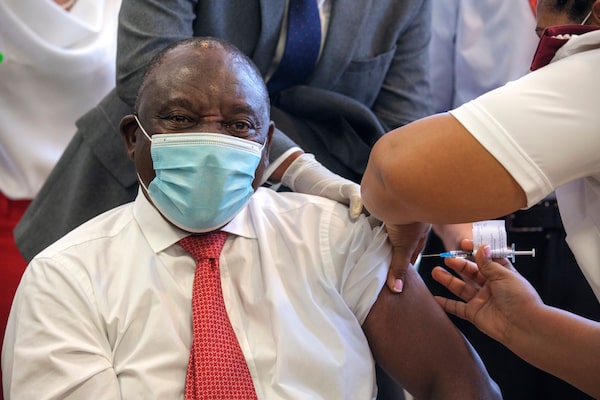
South African President Cyril Ramaphosa receives a Johnson & Johnson COVID-19 vaccine in Khayelitsha, Cape Town, South Africa, on Feb. 17, 2021.Gianluigi Guercia/AFP/Getty Images
Cracking a joke about his fear of needles, South African President Cyril Ramaphosa on Wednesday became one of the first people to receive a COVID-19 vaccination in the country that has by far the highest confirmed virus caseload in Africa.
“Can I close my eyes?” Ramaphosa bantered as a health worker injected him with the Johnson & Johnson vaccine in a live broadcast on South African television.
Staff at the district hospital in Khayelitsha, a poor township near Cape Town, applauded. Minutes later, Ramaphosa urged South Africa’s 60 million people to have confidence in the vaccines despite a bumpy start to the inoculation campaign marked by a last-minute switch of vaccines.
The first phase of vaccinating the country’s health care workers will now begin as an observational study because the J&J shots are not yet authorized for general use here or anywhere in the world.
“I must say that at first I was a bit terrified of this long needle that was going to be embedded in my arm, but it happened so quickly and so easily,” Ramaphosa said. “This day marks a milestone for South Africa. Finally, the vaccines are here, and they are being administered.
“I’d like to invite South Africans to take this up so that we can all be safe and we can all be healthy.”
Only a week ago, South Africa’s minister of health announced the country would not roll out AstraZeneca vaccines after months of preparation because a small study showed they were not as effective against the variant that is now dominant in Africa’s most developed economy.
Instead, South Africa switched suddenly to the J&J vaccines and only received a shipment of 80,000 doses flown in from Belgium late Tuesday night. Those vaccines were taken straight to a secure facility and shipped to vaccination centres across the country overnight to be ready for the rollout on Wednesday, the government said.
Ramaphosa said he was relieved when his minister of health sent him text messages and photos confirming the late-night arrival in Johannesburg of the jet carrying the vaccines.
South Africa has put its faith in the J&J vaccine after a large international clinical trial showed it to be effective in offering protection from the variant first identified in the country in December. Early results from that trial showed it had 57 per cent efficacy against moderate to severe cases of COVID-19 caused by the variant, and a higher efficacy against severe illness and hospitalization.
Ramaphosa was the sixth person to be vaccinated at the Khayelitsha hospital, he said. Five health care workers were given shots before him, with a nurse the first to receive a COVID-19 vaccination in South Africa. Health Minister Zweli Mkhize was also vaccinated. Jabs were given in all the country’s nine provinces.
South Africa has nearly 1.5 million reported coronavirus infections, including more than 48,000 deaths. It has approximately 40 per cent of all the cases reported by Africa’s 54 countries, underlining the need for a successful and rapid vaccine rollout. A resurgence of the virus spiked in January and nearly doubled the country’s cases, hospitalizations and deaths. Experts warn a third surge of infections is likely to hit the country in May or June, when the Southern Hemisphere winter begins.
A successful vaccination drive in South Africa could also embolden the rest of the continent, where fears that poor countries are being left behind in the vaccine race are keenly felt.
Only a handful of other African countries have received vaccines. Zimbabwe hopes to start its program using China’s Sinopharm doses this week. Egypt and Equatorial Guinea have also received Sinopharm vaccines from China.
South Africa has stated it plans to vaccinate around 40 million people by the end of 2021 although government critics say that goal is unrealistic.
At least 380,000 health workers have registered online to receive the first shots as part of the drive to vaccinate the country’s 1.25 million health care workers in the first phase. South Africa is expected to receive an additional 500,000 doses of the J&J vaccine within the next four weeks and has secured 9 million doses of that vaccine and may increase that to 30 million, according to health experts.
South Africa has also secured 20 million Pfizer vaccines, and might also acquire China’s Sinopharm and Russia’s Sputnik V vaccines, Mkhize has said. He told parliament this week that the country has secured all the vaccines needed to inoculate 67 per cent of the population, to achieve herd immunity.
Ramaphosa and Mkhize got their jabs publicly “to demonstrate our confidence in this vaccine and help allay any fears that people may have,” Ramaphosa said before his vaccination.
The J&J vaccines will be given as a large-scale test, in which no placebo shots will be given and the health and future infections of all participants will be tracked, say health experts. The vaccine is currently authorized only for tests by South Africa’s regulatory body, meaning Ramapahosa effectively became part of a large-scale study.
The large number of COVID-19 infections in some places makes it more likely for new variants of the virus to emerge. Science Reporter Ivan Semeniuk explains how vaccines may not be as effective against these new strains, making it a race to control and track the spread of variants before they become a dangerous new outbreak.
The Globe and Mail
Sign up for the Coronavirus Update newsletter to read the day’s essential coronavirus news, features and explainers written by Globe reporters and editors.